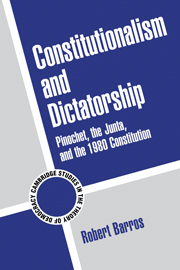Book contents
- Frontmatter
- Contents
- Foreword
- Acknowledgments
- Abbreviations
- Introduction
- 1 Dictatorship, Legality, and Institutional Constraints
- 2 The Constitution of the Exception: Defining the Rules of Military Rule
- 3 The Constitution and the Dictatorship: The Supreme Court and the Constitutionality of Decree-Laws
- 4 The Shadowy Boundary between Force and Law: The Judiciary, Repression, and the Cosmetic Limitation of Emergency Powers
- 5 Constitutionalization without Transition: Prompting the Dual Constitution of 1980
- 6 The Permanent Text: Constitutional Controls or Military Tutelage?
- 7 Even Custom Shoes Bind: Military Rule under the Constitution, 1981–1988
- 8 Military Dictatorship and Constitutionalism in Chile
- References
- Index
4 - The Shadowy Boundary between Force and Law: The Judiciary, Repression, and the Cosmetic Limitation of Emergency Powers
Published online by Cambridge University Press: 10 December 2009
- Frontmatter
- Contents
- Foreword
- Acknowledgments
- Abbreviations
- Introduction
- 1 Dictatorship, Legality, and Institutional Constraints
- 2 The Constitution of the Exception: Defining the Rules of Military Rule
- 3 The Constitution and the Dictatorship: The Supreme Court and the Constitutionality of Decree-Laws
- 4 The Shadowy Boundary between Force and Law: The Judiciary, Repression, and the Cosmetic Limitation of Emergency Powers
- 5 Constitutionalization without Transition: Prompting the Dual Constitution of 1980
- 6 The Permanent Text: Constitutional Controls or Military Tutelage?
- 7 Even Custom Shoes Bind: Military Rule under the Constitution, 1981–1988
- 8 Military Dictatorship and Constitutionalism in Chile
- References
- Index
Summary
With the massive repression unleashed by the military coup, the definition of the boundaries between law and extralegal force immediately emerged as potentially the most explosive point of contact between the judiciary and the military regime. As in any legal system conforming to the rule of law, Chilean constitutional and statutory law stipulated that all arrests had to comply with strict guarantees protecting individual freedoms, incarceration could only follow conviction by trial, and, even under constitutional states of emergency, such as the state of siege, due process remained in force and the scope of emergency powers was delimited. In the days following the coup, before the onslaught of repressive military power, these norms faded from the horizon. Mass detentions, summary executions, bodies in the Mapocho River, and the first military tribunals were clear signals that the precise argument of lawyers had given way to time of war, as the military itself characterized the period for legal purposes.
Nevertheless, despite this abrupt displacement, under the constitution the judiciary held the authority, if not the power, to see that these transgressions were corrected. The judiciary's relevant authority in this new context was twofold. First, on petition, the judiciary was empowered to uphold constitutional guarantees of due process and protect persons from arbitrary arrest. The instrument was the recurso de amparo, a writ similar to habeas corpus, which on appeal could proceed to the Supreme Court. Second, although the declaration of a state of siege gave military courts jurisdiction over most political offenses, the constitution authorized the Supreme Court to supervise all courts, which implied that the Court held the authority to review and correct the administration of military justice.
- Type
- Chapter
- Information
- Constitutionalism and DictatorshipPinochet, the Junta, and the 1980 Constitution, pp. 117 - 166Publisher: Cambridge University PressPrint publication year: 2002



